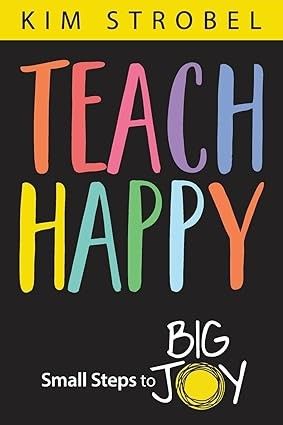Teach Happy: Small Steps To Big Joy By Kim Strobel Empowers Educators To Reclaim Their Happiness

Professionals in the education sector experience alarming levels of stress. According to the Teacher Wellbeing Index 2022, 75% of the education staff across various roles struggle with its effects, with 84% of the senior leaders reporting high-stress levels. This issue stems from the relentless demands imposed on educators, which often lead to them experiencing cognitive overload.
Teachers, in particular, are said to be burdened by making approximately 1,500 decisions in a day. This mental load isn't the only burden they carry, as they find themselves depleted physically and emotionally, with little respite or control over the system they navigate daily. They then find it challenging to prioritize their well-being, given that they strive to always show the best version of themselves, illustrating the dedication they have toward their students and profession.
Kim Strobel, a mindset and motivation speaker, made it her mission to advocate for a shift toward prioritizing happiness and well-being through her recently released book, Teach Happy: Small Steps to Big Joy. Kim, having worked with thousands of educators across the country, witnessed firsthand how they face invisible struggles, from anxiety and guilt to stress and feelings of defeat.
The former teacher and curriculum director turned happiness coach believes educators deserve to lead fulfilling lives, both within and outside the classroom. With this in mind, Kim penned Teach Happy to provide readers with a roadmap toward living a happier personal and professional life. She incorporated science-backed strategies and powerful tools to guide readers in refueling, recharging, and reclaiming what matters most—serving their students to the best of their ability by first showing up for themselves.
"I don't know if we can control the beast that is the education profession and the overwhelming expectations that continue to be placed upon us. What I do know and focus on is giving teachers practical tools to navigate a difficult profession and take control of the only thing we have power over - ourselves. When we decide how we want to feel in our lives, then we must align our actions and our values accordingly. Only by nurturing our emotional and mental well-being can we show up for our students," Kim remarks.
The author aims to provide readers with small, actionable steps that can create a ripple effect in their lives. "Even if it's just as small as 1% each day, it can lead to an avalanche of positivity that will allow us to redirect our energy toward what brings us more joy and fulfillment, not just in our professional lives, but also in other important parts of our lives that deserve equal attention and care," she adds.
Kim highlights that individuals have this tendency to feel anxious when not experiencing stress. It's a common psychological response that comes from a deeply ingrained familiarity with stress, which leads individuals to associate it with productivity and a sense of purpose. In professions characterized by high levels of stress, such as teaching, this tendency may be even more evident.
An example of this phenomenon can be seen in the story of an 84-year-old teacher who continues to work despite experiencing collapsed discs and physical fragility. Retiring hasn't entered her mind, as she fears that stopping working would make her "disappear." This instance illustrates how many in the education sector equate their sense of self-worth and identity with their profession.
In her book, Kim stresses the importance of what she calls radical wellness. She introduces this concept as being an approach that challenges individuals to prioritize themselves in ways that may feel uncomfortable or unfamiliar. For teachers, radical wellness entails shifting their view of self-care as more than just temporary relief from stress. This means prioritizing their mental and physical health in ways that promote long-term well-being.
"Many teachers, especially women, have this idea that self-care is selfish. They feel guilty for prioritizing their own needs. Prioritizing oneself isn't the same as neglecting others. Teachers need to invest in their growth and well-being," Kim asserts.
For educators, moving toward radical wellness means breaking free from the cycle of stress and burnout. This may require waking up early to exercise, setting boundaries on volunteer commitments, seeking therapy, or dedicating time to mindfulness practices. Teach Happy has a dedicated chapter to physical exercise, demonstrating the connection between the body and the mind. Here, Kim draws inspiration from Dr. Phil Stutz's concept of the life force pyramid, wherein the body plays a pivotal role in promoting overall vitality and happiness.
Speaking of happiness, Kim has leveraged insights from distinguished professor Sonja Lyubomirsky's book, The How of Happiness, in shaping her unique approach to happiness, breaking it down into three major sources—genetics (50%), circumstances (10%), and thoughts, actions, and behaviors (40%). "This means 40% of our happiness is within our control," Kim says. By acknowledging this, the author encourages readers to implement meaningful changes to enhance their overall well-being.
Through Teach Happy: Small Steps to Big Joy, Kimempowers educators to reclaim their happiness by reframing their thoughts, actions, and behaviors through positive habits, leading to a joyful and more fulfilling life. She looks forward to reinforcing this approach with more transformative insights to reach a broader audience beyond educators.
© Copyright IBTimes 2025. All rights reserved.





















